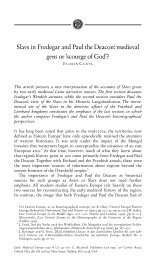A READER IN COMPARATIVE INDO-EUROPEAN MYTHOLOGY
A READER IN COMPARATIVE INDO-EUROPEAN MYTHOLOGY
A READER IN COMPARATIVE INDO-EUROPEAN MYTHOLOGY
Create successful ePaper yourself
Turn your PDF publications into a flip-book with our unique Google optimized e-Paper software.
(in the shape of a bull he impregnated his mistress Europa). But, on the whole, it appears that<br />
Hittites, as well as Indo-Europeans, worshipped their gods in the human shape, but that, being<br />
very powerful, the gods could, if they wished, change their shape into particular animals.<br />
As in many other religions of the Ancient Near East, the proper attitude of humans towards<br />
gods is the one of slaves, or servants to their masters. The structure of the divine society is<br />
modelled according to the structure of the human society, so that, for instance, the king is seen<br />
as the chief servant of the gods. If they are not served properly, the gods are likely to take<br />
offence, and to punish the negligent servant and his property (including his family and his<br />
land, i.e. the land of the Hittites). Only regular sacrifices can supress the wrath of the gods,<br />
who usually do not forget the sins of the humans. When king Shuppilulliumash («He of the<br />
pure sources») forgot to perform the sacrifice to the river Mala (Euphrates), the plague<br />
ravished his land for twenty years. Failure to perform the proper sacrifices is a sin, just like<br />
breaking one of many taboos that affected the life of ordinary people as well as of kings. The<br />
most awful of all taboos are called hurkil, e.g. having sex with cows, dogs, or pigs, but,<br />
interestingly, having sex with horses is not a hurkil according to Hittite laws.<br />
In the last decades of the existence of the Hittite empire, it seems that a new conception<br />
gained ground: the last Hittite kings had their own personal protectors, with whom they<br />
established a more personal relationship; as Hattushili III tells us in his autobiography, he was<br />
the favourite of Ishtar of Shamukha since he was born, and it was this goddess that helped his<br />
way to the throne. It is important to note that many Hittites bore theophoric names, but some<br />
of these names were never recorded outside of the royal family. This might mean that several<br />
deities – including, probably, most of the Hattic gods and goddesses – were only worshipped<br />
at the court, as part of the official cult, whereas they were practically unknown among the<br />
ordinary people.<br />
Eschatological conceptions of the Hittites are not altogether clear; broken vessels in tombs,<br />
together with remains of food and drinks, clearly indicate that some sort of afterlife was<br />
envisaged, and in the case of the king, it was generally thought that he would be deified after<br />
his death; in fact, the common expression for 'he died', when applied to kings, is 'he became<br />
god'. Note that in Egypt, the Pharaohs were thought to be gods already during their lifetime,<br />
and the Hittite habit of deifying their kings is similar to Roman solemn declarations by the<br />
Senate that people like Caesar, Augustus, and other emperors became gods after dying. There<br />
is, moreover, the conception of the «meadow of the otherworld» (Hitt. wellu-), where the king<br />
is supposed to pasture his flocks in the afterlife. This has clear parallels in Greek (the Elysian<br />
fields) and, perhaps, Celtic (OIr. mag mell). It is quite unclear where the meadow of the<br />
otherworld is supposed to be located.<br />
The priests were a numerous and very privileged caste in the Hittite society. Their duty was to<br />
take care of the temple, seen as the house of gods. The gods were thought to be actually living<br />
in the temple, and they were represented by their statues, many of which were excavated at<br />
Hittite sites. Taking away a statue of a god was considered as an ill-omen. The priests were<br />
also responsible for various rites and sacrifices, and these had to be performed according to<br />
rigidly prescribed instructions, in conditions of ritual purity – pollution or impurity (Hitt.



